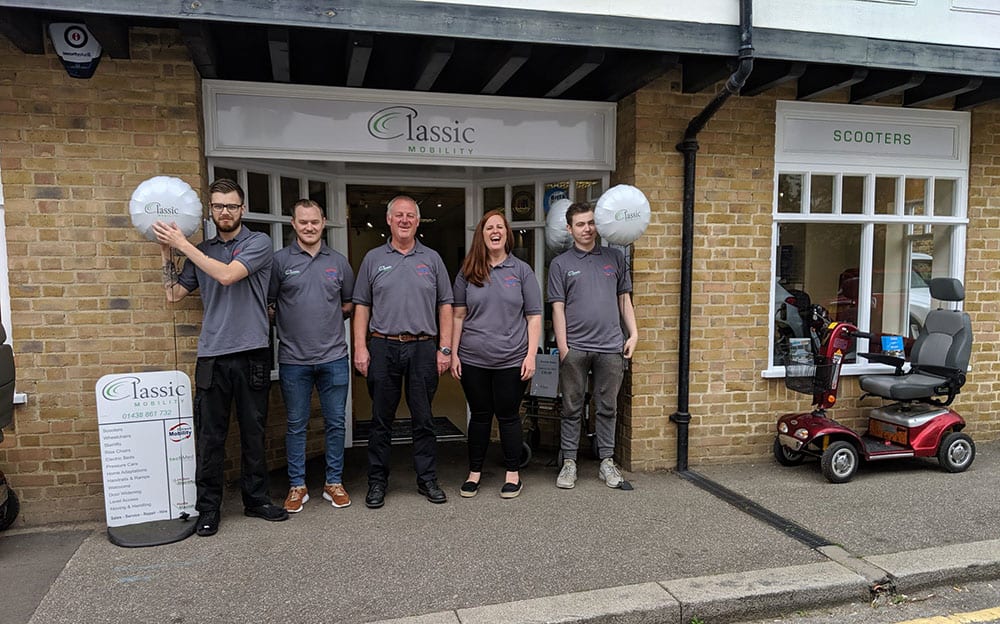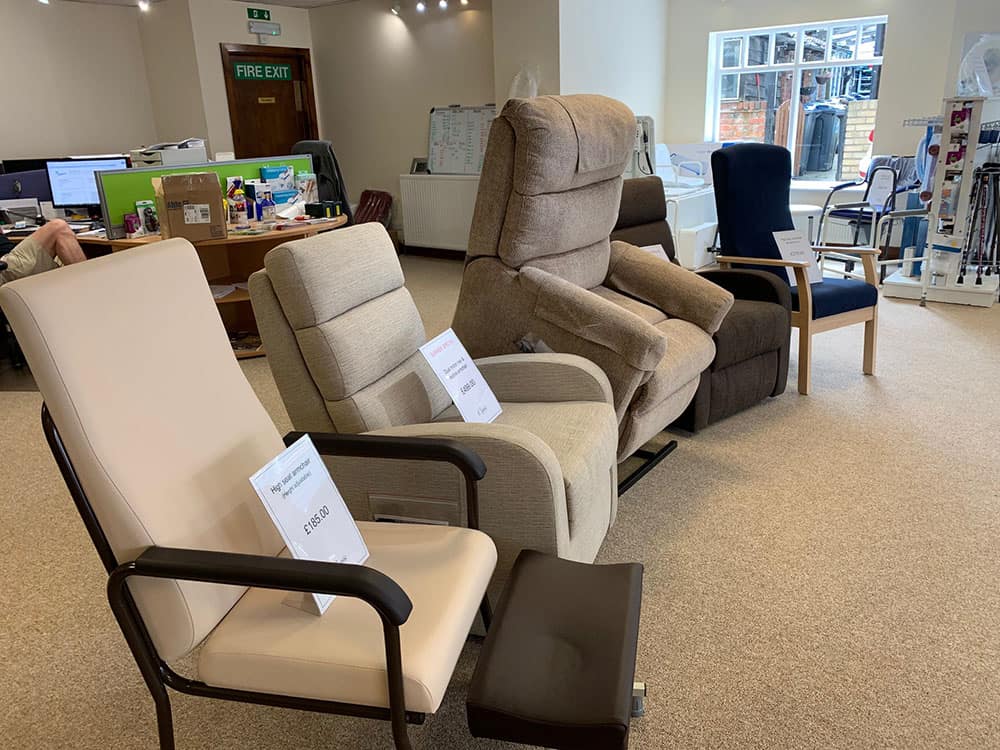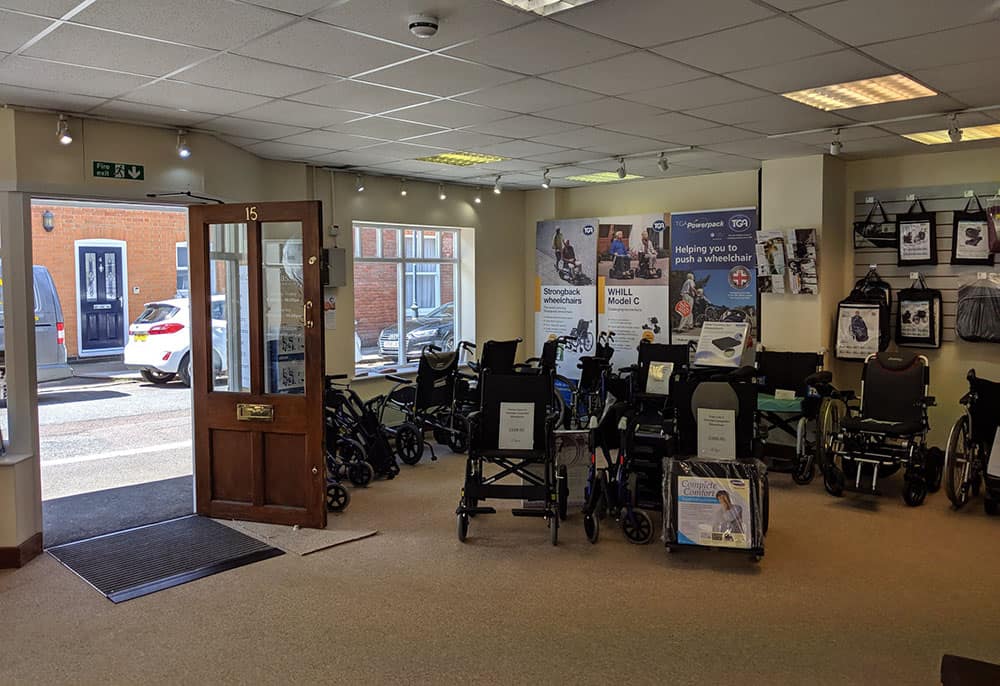Retailer Spotlight: Direct Mobility Hire & Classic Mobility
A clinical approach to mobility retail
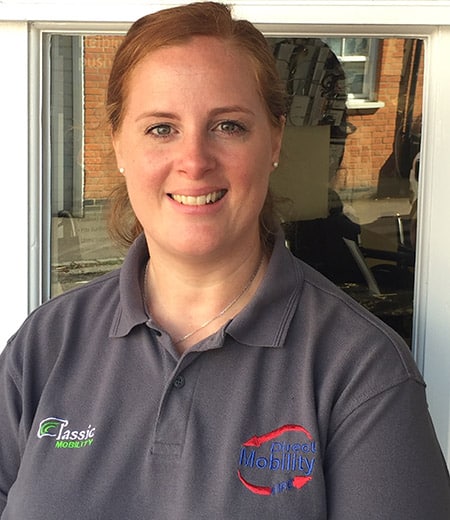
After a number of serendipitous experiences, Lauren Bromfield’s journey in the mobility industry could almost be described as fate, having worked for Motability, qualifying as an OT and working for the NHS before becoming a director of TechMed Services – the parent company for established mobility businesses Direct Mobility Hire and Classic Mobility. THIIS caught up with the busy director as Direct Mobility Hire celebrates its 20th year anniversary to find out more about the history of the two companies, a recent decision to relocate, as well as her personal experience of trying to strike the right balance between clinical and business needs.
Direct Mobility Hire has reached its impressive 20-year anniversary, how did the company first start?
“Initially Direct Mobility Hire started life as Homecare in 1989 by an OT who was struggling to find equipment for her clients on a short-term basis. The NHS wasn’t providing equipment loans on a short-term basis and there wasn’t any rental service out there that she could find so she decided to set it up for herself.
“The business grew quite quickly and she found it too large to manage so she decided to put the business up for sale, which is how my father became involved in the mobility industry.”
What motivated your father to purchase the mobility hire company?
“My dad John Eden had just sold a successful windscreen replacement franchise with his business partner Vaughan Cox and they were seeking a new challenge. They saw Homecare for sale and while it was something completely different from the business they had been in, it also shared similarities in terms of the need for quick and high-quality customer service.
“They began having conversations with the owner but then my brother was involved in quite a bad accident that caused serious damage to his hip, so he was in the Royal National Orthopaedic Hospital. My dad put all of his business interests on hold as my brother was recovering but when my brother was ready to be discharged, the discharge nurse was explaining the do’s and don’ts of recovery and informed us that because my brother was only temporarily disabled, he wouldn’t qualify for any equipment.
“This was the exact gap that Homecare operated in, so after experiencing first-hand just how important the rental service was, it motivated my dad to complete the purchase of Homecare.”
Why did the company change from Homecare to Direct Mobility Hire?
“Immediately after finishing the deal at the end of 1998, my dad and Vaughan found that the company was being confused with providing care services, rather than care equipment, so they decided to rename the company to Direct Mobility Hire in April 1999.
“It was from this point that the company really became established, developing existing and new clients, as well as substantially expanding the range of equipment available for hire.”
Is your father still involved in the running of Direct Mobility Hire?
“He is. His business partner and friend Vaughan, unfortunately, passed away last year from a brain tumour and although he was no longer a director of the company, he was still really close with my dad.
“His passing was another massive insight into the importance of our industry as it was only a year from diagnosis that he passed and, in that time, there was a lot of equipment he needed which we were fortunate enough to be able to provide to him immediately.
“It was during his time at the hospice that our eyes were really opened to the incredible work they do. My dad visited Vaughan daily and despite having worked in the industry for years, to have that real personal experience of seeing someone’s care whilst being nursed at home and then at the hospice left us with so much more empathy for the clients we work with who are often in that same position.
“Now we are carrying out the servicing for the hospice free of charge and giving them free equipment. We are just trying to do whatever we can really to help support the amazing work they do.”
How did you first become involved in the mobility industry?
“Like many people, I left school after my GCSEs without a passion for a career – I didn’t really know what I wanted to do so I started working with the charity Motability.
“I was there for around five years before getting made redundant because the offices moved to Bristol, so I decided to go travelling, still unsure what I wanted to pursue as a career.
“When I returned from travelling, my dad asked me to work with him whilst I was looking for employment. I was really only planning to do it for a short time, however, I ended up falling in love with the rewarding nature of the business and soon become a permanent employee. That was around four years before I looked into becoming an OT.”
What inspired you to branch out and become a qualified OT?
“With Direct Mobility Hire, we had been working closely and doing lots of visits with healthcare professionals. The more I worked with them, the more intrigued I became into the role so I decided to look into taking it further.
“Having been out of education for five years, I went on to complete an access course in London for a year before completing my three-year occupational therapy degree in York.
“It felt like I had finally found something that I had a passion for and a career that was definitely for me.”
Was working as an OT as you expected from your experience working with OTs on the equipment hire side?
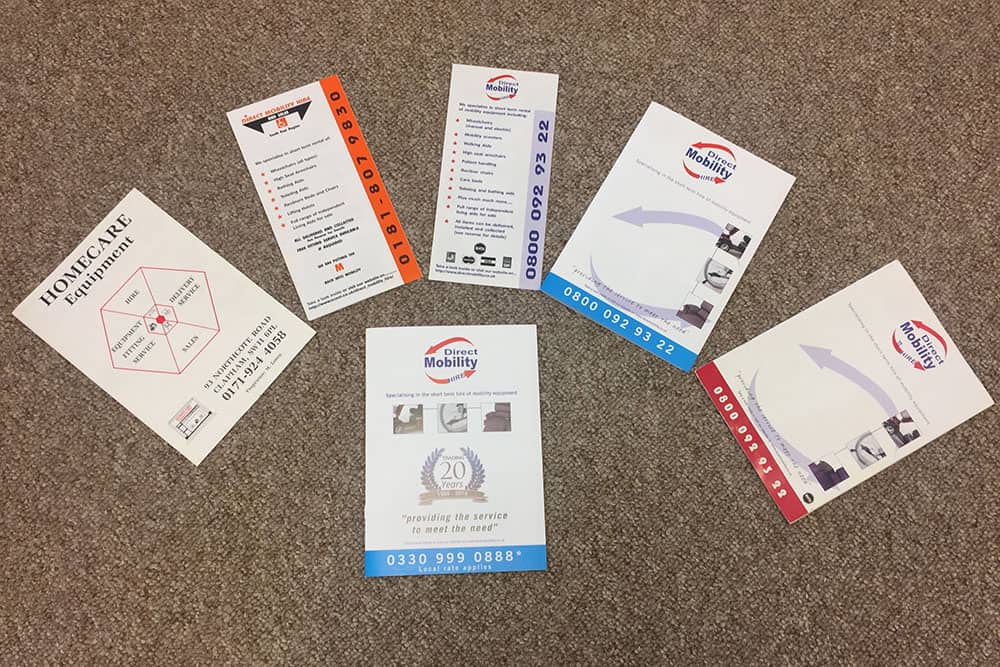
“I had never heard of occupational therapy or occupational therapists before I started working at Direct Mobility Hire and before I started studying, I didn’t realise the breadth of occupational therapy.
“I qualified six years ago and after qualifying, I took on a role that I loved within the NHS, working in forensics settings for adults with learning difficulties.”
“There are so many different roles you can be in and I only used to the physical side with equipment so it was such a different role from what I had been used to.
“Whilst I was working in that forensic setting, my dad merged Direct Mobility Hire with Classic Mobility, a mobility retailer based in Hertfordshire.”
How did the merger of Direct Mobility Hire and Classic Mobility come about?
“We had been working with Classic Mobility for many years because they used to carry out the service and maintenance for our hire fleet.
“Initially, my dad John and the directors of Classic Mobility, two brothers-in-law, began a collaborative company offering long-term rental of equipment called Mobility Rentals, where Direct Mobility Hire would provide the equipment and logistics whilst Classic Mobility would do the servicing and maintenance.
“After many successful years working together and building a close working relationship, it just made sense to merge the companies because the working relationship was tried and tested.
“In 2011, all the companies came together under the TechMed Services umbrella, with Mobility Rentals being closed down and Direct Mobility Hire picking up its work, as there was no longer a need for a separate company.”
Working for the NHS in the role you were enjoying, why did you decide to come back to the family business?
“Again, it was due to another unfortunate circumstance. During that time, one of the directors of Classic Mobility suffered a bad stroke hospitalised him for a long period of time, so my dad covered his role which primarily consisted of moving and handling projects, such as surveying for ceiling track hoists.
“It meant his role of heading up Direct Mobility Hire was left behind and despite having a great management team in place, it was lacking my dad as the driving force.
“In the end, my dad contacted me and asked if I would come and assist, which I was always happy to do despite it not being in my plan, so I handed my notice in and came back to the company.”
What convinced you to stay in the business and become a director?
“Coming back reignited my passion and I haven’t looked back since.
“The merger has gone really well and the company is going from strength-to-strength, however, following his stroke, one of the Classic Mobility founders did not return to the business. Instead, my father and the remaining Classic Mobility founder Alec, along with his wife Carol, continued to run the business.
“Last year, Alec and Carol retired and I decided to become a director of the company. Now, between my father and me, we are covering everything across the Group.”
Does it seem like there have been a number of fateful moments that have led to you coming back to Direct Mobility Hire and Classic Mobility?
“Definitely. It really is a case of everything happens for a reason.”
You’ve recently relocated Direct Mobility Hire and Classic Mobility closer together geographically, what prompted the decision?
“Direct Mobility Hire has always been based in North London and Classic Mobility in Hertfordshire, so although both companies covered the same areas, which is London and the Home Counties, they were still based in different premises.
“Direct Mobility Hire’s premises in London consisted of a small showroom, an office area which handled all the administration, as well as the warehouse which we had completely outgrown, so we were already on the lookout for a new site.
“With Classic Mobility’s founders retiring, the time seemed right to bring the companies together into one location, so we decided to move both companies to Hertford.”
Why did you pick Hertford as the right place to relocate both companies?
“Hertford has a lot going for it and it felt right. Classic Mobility was already only 15-miles away from Hertford and the location is great; it has a wonderful community feel and still has great links onto major roads for our serviceable areas.
“Originally Direct Mobility Hire had a showroom but we found a majority of the hire work is done over the phone. In Hertford, we found two great properties, one being a showroom for Classic Mobility and the other being a separate warehouse unit only a five-minute walk away, which is ideal for our needs.”
By bringing the two locations together, are you also planning to bring the brands together as well?
“We’ve had lots of discussions about this and have decided to keep the names separate. When we first merged, we changed all of the brandings of both companies to TechMed Services but we felt the individual brands of Directly Mobility Hire and Classic Mobility, which we had worked hard to develop, lost their identities.
“We decided the best thing to do was to split the branding again. Now, the showroom part of the operation is Classic Mobility and the warehouse unit is primarily for mobility hire, as it has the storage and cleaning facilities. Most of the hire equipment is delivered and installed to clients’ houses or hotels, rather than collected from the showroom, so we thought keeping the brands apart would help reduce any confusion.
“By the nature of the name Direct Mobility Hire, it is clear who we are and what we do, whilst customers know Classic Mobility deals with sales, repairs, servicing and adaptations, so although we are all one company, we do not want to blur those identities too much.”
How has the new Classic Mobility showroom improved from its previous retail space?
“The new showroom is in Hertford town centre, just off of the high street. It is a much larger space than we had previously and we have focused on keeping it bright and spacious. It stocks all of the standard ADL equipment, walking aids, a range of scooter and wheelchairs, along with everything else you would expect to see in a mobility store.
“We also have a range of specialist seating which I carry out the assessments for. Often these will take place in a client’s home or a care home but we also carry demo models in the showroom in case people come in and are not sure what they need.”
How have you encouraged customers to visit the new store?
“We did consider if not being on the high street would impact us in terms of sales but for many products, particularly the specialist seating, these are not the type of items people will walk by on the high street and purchase, so passing trade isn’t the most important factor for us.
“It is more about people knowing where we are and what we offer, which comes from providing a good service and word of mouth. In particular, we have worked hard to raise awareness amongst important contacts in the community and have already had nurses visit us from local doctor’s surgery and pharmacies approaching us
“One of the services we offer as a company is assessments, which I carry out in people’s homes, hospitals and care homes, however, we also offer a free weekly drop-in advice clinic in the showroom which I had been doing at our London branch and am continuing in Hertford.”
How does the free drop-in advice clinic work?
“We advertise a three-hour slot where people can book in and can have an informal discussion with or without the client to go through their needs with a qualified healthcare professional without having to pay for a chargeable assessment on site.
“The service is popular because often people will not always know what equipment they want, so it helps make sure people get the equipment and advice that is right for them without paying an OT assessment.
“A lot of people I see in-store receive this anyway but for clients that want to have a more in-depth chat about their needs, I will suggest that they visit me at the drop-in clinic where we can really spend time finding out all about their needs.”
As an OT yourself, how important is having that clinical expertise as a mobility retailer?
“I think it’s really important but I would say that, being a healthcare professional! I see so many clients using inappropriate equipment which they have purchased online or someone else has bought for them, with no knowledge of what they are buying or what their needs are.
“We see so many customers with inappropriate wheelchairs that haven’t been set up or adjusted for them because they were not aware that it could or needed to be adjusted, which is worrying.
“Even though we have a really experienced team here, there are some queries which require clinical reasoning.”
Do you find having that OT experience helps you to engage with other healthcare professionals?
“Yes, I do think so. We have great links within the NHS and when they are unable to provide the equipment, they will come to us. We also have close ties to private clinics in London.
“I think being an occupational therapist helps because from their point of view, they are working with someone that speaks their language which really helps develop trust.”
Do you think more companies involved in the provision of mobility equipment should be required to have some form of healthcare professional qualification?
“It doesn’t necessarily need to be healthcare professional qualification as there are loads of mobility retailers that go on all the product training course, have tonnes of experience and are very well equipped to deal with clients’ needs.
“There are a lot however who do not have that knowledge and with more online purchasing, where there is less customer interaction, there will be more situations of equipment being used inappropriately.”
How difficult is it marrying up clinical and commercial needs?
“From an OT point of view, you want your clients to have everything and from a business point-of-view, you have to consider margins because as a business, you have overheads, staff, stock and everything else to consider.
“The commercial side has been an steep learning curve and you gain an appreciation of why you can’t simply pass on things at cost to people because it would be impossible for us to grow and continue to expand the range and service that people need.
“So, getting the two to meet, has been interesting and requires me to switch between wearing different hats.”
Recently, a lot of the short-term hiring services in the UK to private customers, such as Shopmobilities and the Red Cross, have been closing or struggling. Are you seeing more or less demand for short-term equipment hire?
“The demand for hire equipment for Direct Mobility Hire remains pretty stable as we hire to such a vast range of clients, including the NHS and private clinics, care homes, private individuals, as well as lots of holidaymakers, travel companies, charities and even film studios and production companies.
“Unlike a service like Shopmobility which may only hire scooters in shopping centres, our product and client portfolio is diverse and consistent, so if one area dips, another area is usually rising.
“There have been lots of companies emerging since we started 20 years ago but we offer such a variety of equipment, from a raised toilet seat to scooters and ceiling track hoists, that are all delivered, installed and collected by our own technicians, that we do still offer a relatively unique service.
“There are a lot of companies that say they do offer a hire service but usually only as an add-on to their core business, with a pretty limited range, whereas hire is Direct Mobility Hire’s core business, so naturally it is well equipped to meet customer’s needs.”
With more competition, how has Direct Mobility Care managed to develop and grow over the years?
“We only operate within an area we can manage to ensure people receive the best care, especially because if something was to go wrong with an electrical product, we need to make sure we can respond immediately to swap or repair it.
“So not stretching ourselves too far and staying committed to our quality and service have been key.
“We go down as far as the South West and occasionally deliver further afield for certain situations, such as if someone may be holidaying. Our core area however is London and the Home Counties and we don’t advertise outside of those areas.
“Also, we are always looking to improve our hire range by getting client feedback and talking with the healthcare professionals we work with, as well as searching for new products by visiting trade shows.
“Really our growth has come from really embracing change and moving the offer in line with what people want. The biggest addition I have seen since being here is the hiring of specialist seating, which we didn’t use to do. It is something we knew there was a demand for so we started working with Kirton and is really benefitting the business.
“For organisations that wish to trial a range before committing to making a purchase, then the hiring option proves an attractive offer and we see a lot of chairs hired on those terms.”
Do you often see customers wishing to purchase a product after hiring it?
“Yes, often people will hire equipment and then want to purchase it. We always offer a free weekly trial so if someone hires a walking frame and tries it for a week and decides to purchase it, then we’ll deduct a week’s hire cost from the purchase price.
“For a lot of these pieces of equipment, from scooters to wheelchairs, people do not know if the aid will be right for them until they really use it in their everyday life and to purchase some of these products new, such as a mobility scooter, can be expensive.
“Fortunately, we are able to give people that opportunity to try the equipment first and if they hire a piece of equipment upfront and they do not like it, it has only cost them the hire fee.”
What do the next 20 years hold for Direct Mobility Hire / Classic Mobility?
“We are very happy with our current business and don’t have plans to expand nationally, although we will continue to look at ways of extending our range. We just want to continue offering a good service to our client base, serve the local community and also embrace changes taking place in the industry.
“Importantly we don’t want to get complacent. We work closely with a social media company and are investing in our website so I think it is important not to get left behind, particularly digitally. We are always looking for what can improve our service but we aren’t trying to take over the world.”
directmobility.co.uk / classicmobility.org.uk
A double ribbon cutting
Classic Mobility’s new location
15 Church Street
Hertford
Hertfordshire
SG14 1EJ
Direct Mobility Hire’s new location
23 Dicker Mill
Hertford
SG13 7AE


